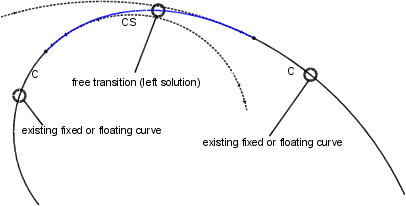Add a free transition between two fixed or floating elements.
A free transition has only one geometric solution, so you cannot specify its length or A value. The solution depends on the type of attachment elements (1, 2), and the order in which they are selected.

To add a free transition (between two curves)
Use this command in situations where you need to create a single compound transition solution as a transition between two curves with different radii. Because free transitions have only one geometric solution, you cannot specify length or A value. The program makes the calculation.
The following illustrations show a free transition between two curves. The solution depends on the selection order of the curve that the transition is being attached to. The first illustration shows a left solution, where the inner circle was selected first. The second illustration shows a right solution, where the inner circle was selected second:


- Click the alignment. Click

 Find.
Find. - On the Alignment Layout Tools toolbar, click
 Free Transition (Between Two Elements).
Free Transition (Between Two Elements). The current transition definition is displayed on the command line. For more information about changing the default transition definition, see To Work With Curve and transition Settings for Alignments.
- Select the element before and the element after to add the transition to.
The solution depends on the order in which you select the curves that the transition is being attached to. For a solution where the transition is coming from the left, select the inner circle first. For a solution where the transition is coming from right, select the inner circle second.
To add a free transition (between two lines)
Add a free transition between two lines in situations where you want the transitions to maintain tangency to the lines they are attached to. For this solution, the transitions are simple, incurve, or outcurve.
The following illustration shows a free transition between two lines. The possible solutions include:
- simple transition incurve
- simple transition outcurve

- Click the alignment. Click

 Find.
Find. - On the Alignment Layout Tools toolbar, click
 Free Transition (Between Two Elements).
Free Transition (Between Two Elements). The current transition definition is displayed at the command line. For more information about changing the default transition definition, see To Work With Curve and transition Settings for Alignments.
- Select the element before and the element after to add the transition to.
- Specify the transition type as either Incurve or Outcurve.
- Specify the transition length or the A value.
To add a free transition (between a line and a curve)
Add a free transition between a line and curve in situations where you want the transition to maintain the radius of the curve it is attached to, even if the curve is edited. For this solution, the transitions are simple because the radius of the transition at the line end is infinite (as opposed to a compound transition, where the radius at each end is finite). This solution between a line and a curve is valid for all transition types because all transitions types support the simple transition.
The two possible solutions depend on which element you select first, either the line or the curve.
The following illustration shows a free transition between a line and a curve, where the line was selected first:

- Click the alignment. Click

 Find.
Find. - On the Alignment Layout Tools toolbar, click
 Free Transition (Between Two Elements).
Free Transition (Between Two Elements). The current transition definition is displayed at the command line. For more information about changing the default transition definition, see To Work With Curve and transition Settings for Alignments.
- Select the line before and the curve after to add the transition to.